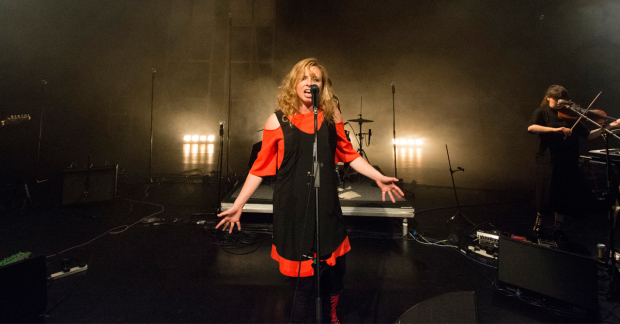Edinburgh review: Blow Off (Traverse Theatre)
This piece about a woman about to commit a suicide bombing leaves you ‘wondering when we were going to get to the good part’

© Niall Walker
AJ Taudevin’s new play for this year's Fringe centres on an ordinary woman in ordinary surroundings, about to commit a suicide bombing. The story is told by one actor/singer who shares the blank stage with a three-piece band that provides the soundtrack for the unfolding story, exploring why she does it. It’s a brilliant conceit for a play; so why did it leave me feeling so flat and frustrated?
For one thing, it’s the repetitiousness of the language. The play goes out of its way to reinforce the ordinariness of the situation. The narrator (a virtuosic, if histrionic, performance from the playwright herself) keeps stressing what she isn’t telling us: we don’t know the woman’s name, for example, and we don’t know anything about her appearance because, Taudevin tells us, she could be anybody. Likewise, the street on which much of the action takes place is meant to be painfully normal ("You know it," we are repeatedly told), which reinforces the extraordinary nature of the central deed. Fair enough, but did we really need to be told this so many times? It felt as though the germ of a good idea had been overwritten to the point that it had taken over and replaced some of the things I really wanted to know.
Likewise, so much of the backstory left me drumming my fingers and wondering when we were going to get to the good part. Who cares that, unlike her brother, she couldn’t pee through the fence as a child? I wanted to know more about the significance of Phil, her lover, and about the physical assault she had undergone. There are dark hints, such as the mysterious Black Horse, but they left me with the feeling of something that had been only half thought-through, not of something that could fire my imagination.
The play’s form didn’t help, either. It’s a monologue delivered with the accompaniment of a band, Glasgow-based Tuff Love, and I liked the idea of having the music commenting on the unfolding situation; but in the event the music often distracted from the drama and barely illuminated things at all. I enjoyed a lot of their songs, especially "Green Light Go" and their grungy take on "Alouette", but other bits of music got in the way and, while the "Ladybits Song" was linguistically playful, I couldn’t see its purpose in the drama. Furthermore – and this is a dull but serious complaint – too often the music simply drowned the monologue. Several times, either in speaking or singing, I simply couldn’t make out what Taudeville was saying, and pages of the text were just lost on me. Maybe that was a problem specific to where I was sitting in the auditorium, but surely technical issues like that should easily have been sorted out beforehand.
It won me back a little in the final denouement, where some of the threads were pulled together amidst the final countdown, but I left the theatre feeling mostly bothered by a blown opportunity to do something exciting with a great idea.
Blow Off ran at the Traverse Theatre as part of Edinburgh Festival Fringe and will run at Dundee Rep on 20 September.












